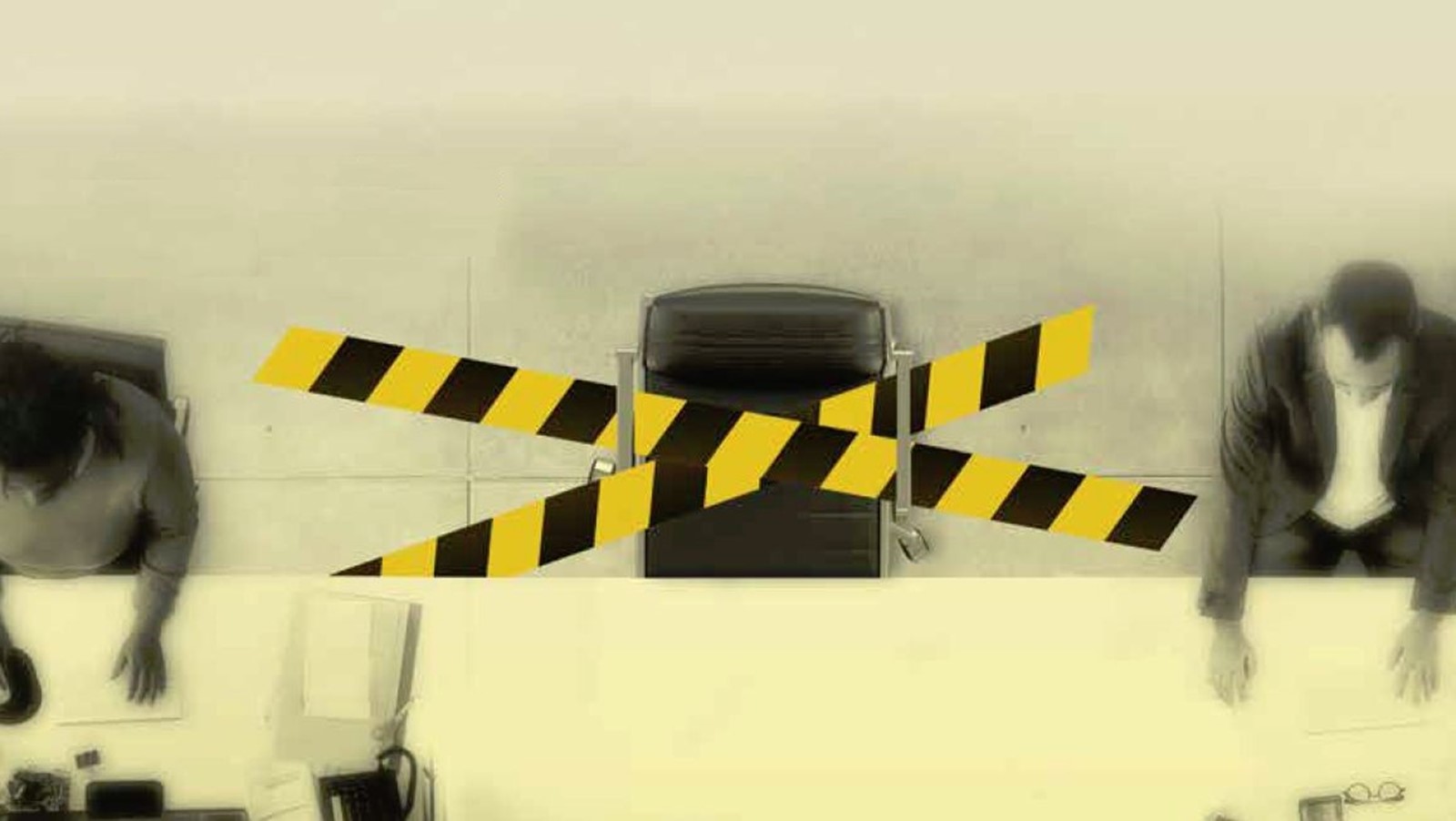"I just feel like giving up and leaving". "I want to plead guilty so it’ll all be over with". "It’s so stupid – I nearly stopped breathing when that brown envelope came through the door". "I can’t talk to my husband, he gets angry and threatens to go in there and punch them". "No-one from work has contacted me – I feel abandoned, like I’m untouchable". "I thought it might take a while – but it’s been six months now. It’s like being in limbo."
These are just some of the comments I have heard from clients facing formal procedures, in my role working in an NHS staff counselling service. Clients tend to fear, often with some reason, the loss of their job, reputation, income, home, and professional career. They may talk of sleepless nights, acute anxiety episodes, isolation, shame and guilt, strain on relationships, feelings of hopelessness, and often a profound sense of unfairness combined with powerlessness. Single parents managing on one income may feel especially vulnerable.
While I do not advocate that the counsellor becomes an expert in these procedures, I think there are common processes which occur, and which have particular psychological effects that the counsellor needs to understand. In this article, I reflect on the central role we play in supporting the client through an unknown and challenging life experience. I also explore some of the powerful group and organisational forces that can be triggered, which both parties need to make sense of rather than just be ‘carried along’ by.
Processes
Until a client is involved in formal employment procedures, it’s unlikely that they will be prepared for the following:
- how suddenly they can be ‘banned’ from the workplace, for example, and how long the process can go on; and what it is like to be on long-term ‘gardening leave’
- how the meetings can feel so formal and threatening, like a courtroom
- how they may hear nothing for ages, and be ‘kept out of the loop’ about what the investigations are uncovering, while forbidden to communicate with colleagues; or the client may be a witness themselves, and be asked to give evidence that gets colleagues into trouble
- how all their previous work may be trawled through for errors; and their chance to answer the allegations may come last, after all the evidence has been gathered, then presented to them in a terrifying pile of documents
The sheer number of meetings, minutes, documents, interviews, can lead to cumulative anxiety over time...and to profound feelings of isolation, of ‘punishment by process’. The client can feel condemned and an outcast, before any outcome is decided. Or those still in the workplace can find it is now filled with an atmosphere of fear and mistrust and a culture of ‘watch your back’
The Chartered Institute of Personnel and Development (CIPD) Survey Report 2015,1 looking at experiences of workplace conflict, recommended mediation rather than formal procedures: ‘It does little good to rely on grievance and discipline procedures, as this will often mean conflict festers until it escalates to a serious level... relying purely on formal procedures to resolve conflict is not a healthy option.’ Public Concern at Work’s report,2 surveying the ‘State of Whistleblowing in the UK’, stated: ‘fifty per cent of whistleblowers reported being dismissed or resigned after raising their concern. A further twenty-eight per cent were bullied by co-workers or victimised and/or disciplined by their employer. This means almost eight out of ten whistleblowers suffer some sort of reprisal.’ Destructive factors such as ‘scapegoating’, or avoiding contact with the ‘suspect’, can come into play when any formal investigative procedures are resorted to. Where we find heavy use of such procedures, it may be a symptom of a disordered organisational culture, which can lead to destructive effects for individuals and teams alike.
Psychological effects
Being ‘in trouble at work’ takes its toll. It can be like a form of protracted bereavement and loss. Whether the client is eventually exonerated or not, there can be a loss of any satisfaction in their work, and of real-life workplace relationships; and long-lasting loss of their previous sense of security and safety, of confidence in their own ability, trust in other people, and faith in the justice of the ‘system’, or the world.
If the counsellor recognises the signs of grief, they can use counselling skills to facilitate the grieving process, and recovery of confidence and clearer thinking. The client may want to make compulsive life-changing moves like leaving their job or profession, or moving away to another place, to get away from the situation and the shame, and the feeling of being forever ‘suspect’. When the client expresses such intentions, it may seem to the counsellor like ‘giving in’, but our job is not to interfere in their decisions. We can however provide a ‘steadying’, calming response, to counterbalance the client’s intense feelings of loss and fear.
It seems that, in particular, a client’s painful feelings from past adult experiences of ‘being in trouble’, or of being ‘under judgment’, seem to be aroused again. Here are some examples from my experience:
- being bullied in institutions or neighbourhoods, or accused of it unfairly
- past or present wrangles over divorce and child access, especially where there has been abuse or ‘coercive control’, antagonistic lawyers and court hearings which seemed unjust
- trouble with authorities, such as police investigations in the family, even when completely innocent
- disputes with public authorities, such as battles to get a child diagnosed as dyslexic or on the ‘autistic spectrum’; or complaints over bad experiences of medical care, or care of elderly relatives
- previous disturbing workplace incidents and investigations, such as assaults, suicides, harassment, (even where only involved as a witness or bystander)
- whistleblowing and the ‘climate of fear’ which can ensue
These can be revealed, as the counselling relationship develops, to be unresolved causes of post-traumatic stress disorder; the workplace counsellor needs to recognise their influence on clients’ reactions to the workplace procedure.
Intense symptoms can return and be re-lived: intrusive thoughts and fears, nightmares, phobic feelings, anxiety attacks, bodily hyper-arousal, physical illness, all the common features of PTSD. Past experience of exhaustion from long battles, unfair outcomes, or of traumatic defeat, may drive current responses and symptoms. So clients may compulsively predict the worst, and be ‘frozen’ in fear-driven states that disable their capacity to ‘fight their corner’. Such presentations pose a challenge for a counsellor’s response – do we advise anything when we recognise such psychological processes? Or allow self-defeating actions to be played out?
So trauma can be generated by these procedures, but also past trauma re-awoken. It is now well recognised that the workplace counsellor needs to have skills in working with PTSD.4 We can educate our clients to recognise the effects of PTSD in themselves, and give them some basic tools for self-management. For example, simple ‘grounding’ techniques can be practised in a therapy session, in times of acute anxiety, hyper-arousal or dissociation. Or when we see a client attempting to function from a place of inner trauma, (‘trauma functioning’), we can engage the client about when it is wiser to ‘take a break’ – to step off the ‘headlong rush’, when clear thinking is absent. We cannot give direct advice, but we can ask them to think about going off sick, for example, to avoid more damage: when a highly stressful workplace, or the investigation itself, is so disturbing that they may have a breakdown, ruin their home relationships, or make bad mistakes (e.g. having an accident through stress and exhaustion).
Repeating the past
Previous life experiences inevitably colour a client’s interpretation of current events, and shape their emotional reaction. So some connections with the past, (e.g. past adult traumas, as above), may be an important part of the counsellor’s work. To take this further, painful childhood experiences, family breakdown and conflict, and the patterns of blame and responsibility learned in childhood, may need to be looked at to enable healing, and can be part of the ‘meaning-making’, the self-understanding the client may seek. Some counsellors may not be comfortable working in this way, if it is not a part of their core training model – and unearthing deeper psychological issues like this may not be appropriate in a short-term counselling setting. It is not unusual for serious childhood trauma to emerge, in exploring the reactions to current ‘trouble’.
One pattern I come across regularly with the (mainly female) clients I see as NHS employees, is an apparent failure of support from the client’s parents when they really needed it: both in the past as a child, or more recently in adulthood. They have often been bullied at school for example, or abused by someone in the family circle, but the parents’ behaviour led them to believe they should somehow cope and be self-reliant without support or recognition. This may be repeated in adulthood by a further failure of support when they have tried to get away from an abusive partner (‘you’ve made your bed’, ‘we never liked him anyway’ or ‘don’t bring scandal on this family’). The legacy can be the following learned thinking patterns: ‘No-one’s going to help, there’s no point in fighting it or looking for support; I’m weak if I can’t handle it on my own; they must be justified in treating me like this; I’ve just got to put my head down and accept blame’.
This dimension is complicated for the counsellor to deal with, if limited to short-term work, e.g. six sessions with an EAP. Sometimes they may be able to negotiate longer-term arrangements. They will always have to decide what can be ‘opened up’ safely, or whether these issues can be worked with at a purely cognitive level, for example. These are technical and ethical challenges and access to a supervisor experienced in workplace counselling is essential.
Giving advice
The counsellor may be sorely tempted to give advice, in cases where the client seems to be allowing themselves to come to harm, by inaction or a ‘defeated’, depressed helpless style of behaviour. But we cannot be a trade union rep, giving advice on how to ‘fight it’; nor can we be an HR specialist or an expert in employment law. However, the workplace counsellor has a role in signposting to such resources, especially if the client is so ‘frozen in the headlights’ that they are not thinking clearly. It may be part of the counsellor’s duty of care to do more than just passive listening: empathy and ‘unconditional positive regard’ can be empowering, but are they going to work fast enough for someone about to be sacked through failure to speak up in their own defence?
In the employment counselling context, we can advise the client to consider seeking advice and representation. And beyond that, if the client is not in a union, we can at least discuss other possibilities: for example, to take a knowledgeable friend along to a hearing – anyone observing and taking notes can make investigators more careful to follow procedures and act with more sensitivity.
Citizen’s Advice can be a good resource, and ACAS and the CIPD have lots of useful material on their websites about such procedures. ‘Public Concern at Work’ can be a resource for those who believe they are ‘whistleblowing’ about abuse or criminal behaviour at work. And clients have taught me about other resources – e.g. one-off legal advice may be covered by home insurance policies; there are websites where GPs who have been through GMC investigations share their experiences; and professional bodies, such as the Nurses and Midwives’ Council, publish details of cases they have investigated. Forewarned is forearmed.
Another resource, if it hasn’t been accessed already, is the employer’s occupational health service, where a client can get advice about sick leave, or a doctor’s letter, for example. This in effect means there is an intermediary between the manager and the employee, reminding everybody about the employee’s ‘wellbeing’ needs, and the employer’s ‘duty of care’.
Clients may become compulsively self-reliant, unwilling to ask partners and friends to give practical and emotional support. (‘I’ve already been so much trouble to them’, ‘I’m being so weak’ etc. They may even have kept the whole thing secret, out of shame and embarrassment). I have asked clients, for example, what they thought about something as simple as taking a partner or friend in the car with them to a hearing, and found that talking through their resistance to the idea can help clients to understand a pattern of habitual self-isolation in times of threat. And so often I then hear that something as simple as asking for that support has helped them get over a severe anxiety state before the meeting, and then given them more confidence to speak up clearly, and so make a better case for themselves.
The counsellor’s own experience
We have to recognise that most counsellors will have had similar life experiences at some point, and these are bound to colour their reactions. Some will have had past disputes with employers and training bodies. Bullying and oppressive behaviour are common in our society;5 and many will have been through painful disputes in their adult relationships, and had to deal with court cases, lawyers and police. In fact it may be precisely such experiences that have led them into this profession.
This is yet another reason for the counsellor to be in a trusting supervision relationship, where any such personal emotional reactions can be owned and explored, to see how they may be colouring the counsellor’s responses and judgments. Our sense of fairness and trust in the world is challenged when we hear that (apparent) cases of gross injustice are about to be perpetrated on apparently caring, conscientious people. What sounds like human error, or mistakes of judgment, are taken to deserve final warnings or dismissal, or humiliating sanctions such as downgrading, or being moved to another workplace. In my own personal practice, I do let clients see that I too feel the sense of injustice, while trying to avoid taking the role of their ‘best mate’, or a ‘loyal parent’, who would always be on their side regardless. If we sit listening impassively, trying to be impartial, the client can take it as confirmation that they really are guilty, or overreacting, ‘being weak’, and that we don’t really believe the authorities could possibly be so unfairly punitive.
In such situations, it may be useful to think of Noreen Tehrani’s description,3 of the four roles that people can be propelled into, in times of workplace conflict –
Persecutor – victim – avenger – rescuer
Counsellors can most easily get caught in the last two roles, especially if we have not come to an inner resolution of our own experiences of injustice. Counsellors can become ‘rescuers’, if we form an opinion of a client’s resilience only from seeing them at their lowest ebb, and don’t have faith that they can recover, and become as strong again as their past successes in life suggest they can be. And we may be tempted to fulfil an ‘avenger’ role, if asked to make a strong written statement in the client’s defence. Work colleagues may be acting out ‘avenger’ roles, persuading clients to take on battles they don’t feel strong enough for (e.g. grievance or bullying allegations). Managers may become ‘persecutors’ when fired up to ‘sort out’ poor workplace relations, or to close down an incident bringing a bad public image to the organisation – they want to ‘weed out’ the ‘bad apple’, but in effect just make someone a scapegoat.
Workplace culture and team relationships
This is the other dimension the workplace counsellor has to come to terms with, when seeing clients going through formal procedures. Workplaces can have a far from ideal management culture, or teams may be affected by bad practice, poor team relationships or workplace bullying. In the modern world, many public sector organisations are under longstanding pressure to cut costs, in the context of reorganisation and increasing workloads. Clients may nonetheless have supportive colleagues and managers. Or teams may be places of unrelenting pressure, with little support or supervision.
Procedures seem to be written on the assumption of a functional and healthy workplace culture; but in practice, the counsellor may discover that they take place in a real world somewhere between the two extremes below:
Procedures in an ideal world
- Context: good team relations, supportive management style, skill development encouraged
- Mistake, incident, complaint
- Quick management response, impartial investigation, everyone supported
- Fair, transparent judgment
- Lessons learned, retraining provided, service improved
- Only genuinely ‘bad’ staff sacked, and discipline only used when unavoidable
Procedures in a dysfunctional workplace
- Context: stressed, overworked staff, poor management style, no skill development, cronyism, bullying etc
- Incident ‘waiting to happen’
- Management response heavy handed, slow, investigation like a witch-hunt or clampdown, no-one knows what’s happening, rumours go wild
- Outcome feels like kangaroo court, guilt pre-decided, excessive punishment
- ‘Watch your back’ team atmosphere, people leave/go off sick, stress gets worse...
In this context, workplace counsellors may find that the best approach is to help the client come to a balanced view of the realities they face: somewhere between a distorted ‘paranoid’ view, in which everyone is a threat, and everyone has already judged them – and, at the other extreme, a ‘hope against hope’ that fairness and justice will just emerge, without having to fight one’s corner.
Counsellors can help clients to find a way to attend to their own wellbeing, while finding a strategy to get the ‘least bad’ outcome, or the best compromise in a flawed world. In this we must respect their values, their own ways of resolving problems, and to trust that they will find their own solution (which may not be the outcome we would have wished for them).
It’s an unfair world out there – justice is not guaranteed, but as counsellors we can facilitate healing, learning, resilience, and the client’s own way of making meaning of it all.
Patrick Quinn is a psychotherapist and supervisor, with twenty-five years’ experience in NHS mental health services, and twenty in staff counselling. He enjoys leading training workshops in personality disorders, trauma, adult bullying and workplace counselling.
More from Counselling at Work

Overload and collapse
Open article: Chris Johnstone addresses the epidemic of workplace overload. What role might we play in shifting personal and organisational cultures to support the recovery of wellbeing? Counselling at Work, Summer 2016

The sacrificial organisation
Open article: Why is scapegoating so common at work? Vanessa Avery explains how it can manifest and what organisations can do to create a culture that protects against it. Counselling at Work, Spring 2016

Horses at work
Free article: Businesses are turning to equine-guided learning to seek out new professional development opportunities for their employees. Suzanne Slade explains why. Counselling at Work, Winter 2015
References
1 CIPD. [Online.] https://www.cipd.co.uk/binaries/getting-under-skin-workplace-conflict_2015-tracing-experiences-employees.pdf (accessed 7 September 2015).
2 Public Concern at Work. http://www.pcaw.co.uk/latest/blog/new-pcaw-report-and-yougov-survey-into-the-state-of-whistleblowing-in-the-uk (accessed 5 October 2016).
3 Tehrani N. Workplace bullying: the role for counselling. In: Einarsen S, Hoel H, Zapf D, Cooper C (eds). Bullying and harassment in the workplace: developments in theory, research and practice, (2nd ed). London/Atlanta: CBC Press; 2011 (pp381–396).
4 Banning N. Counselling the workforce. Therapy Today 2016; 27(3): 32–35.
5 Quinn P. Adult bullying – are we taking it seriously? Therapy Today 2015; 26(8): 18–21.
